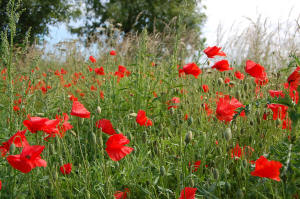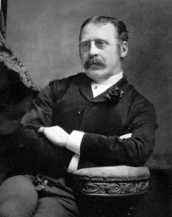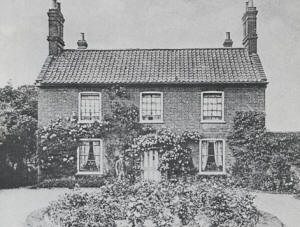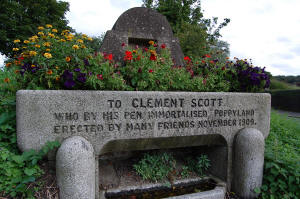| Poppy Land is a term that was coined in the 19th
Century by the poet and theatre critic Clement Scott and
generally refers to the section of the North Norfolk coast
from Sheringham to
Mundesley.

Poppyland

Clement Scott
Scott first visited the area in 1883 courtesy of the
new railway line from Norwich to Cromer. Disembarking at
Cromer, he was unable to secure accommodation
and so walked
along the coast to Overstrand
and Sidestrand. Here he found accommodation at the Mill
House and, by accident, discovered the rural idyll he was
searching for.

The Mill House at
Sidestrand
His subsequent letters to the Daily Telegraph
and his book Poppy-Land - Papers Descriptive on the
East Coast (1886) helped
to popularise this unspoilt section of Norfolk and many other
Victorians followed in his footsteps.
The actual term 'Poppyland' first appeared in Scott's
poem The Garden of Sleep - which was composed in
Sidestrand churchyard. The church was situated close to
the cliff edge and its tower finally toppled onto the
beach in 1916. The current church at Sidestrand was
rebuilt in 1881 using flint from the
original church. However, a new tower was constructed
which was a replica of the original 15th century
octagon. The miller's daughter who Scott fell in love
with - Louie Jermy - is buried in the graveyard of the
church.
|
| The Garden of
Sleep On the grass of the cliff, at the edge of the steep,
God planted a garden - a garden of sleep!
'Neath the blue of sky, in the green of the corn,
It is there that the regal red poppies are born!
Brief days of desire, and long dreams of delight,
They are mine when Poppy-Land cometh in sight.
In music of distance, with eyes that are wet,
It is there I remember, and there I forget!
O! heart of my heart! where the poppies are born,
I am waiting for thee, in the hush of the corn.
Sleep! Sleep!
From the Cliff to the Deep!
Sleep, my Poppy-Land,
Sleep!
In my garden of sleep, where red poppies are spread,
I wait for the living, alone with the dead!
For a tower in ruins stands guard o'er the deep,
At whose feet are green graves of dear women asleep!
Did they love as I love, when they lived by the sea?
Did they wait as I wait, for the days that may be?
Was it hope or fulfilling that entered each breast,
Ere death gave release, and the poppies gave rest?
O! life of my life! on the cliffs by the sea,
By the graves in the grass, I am waiting for thee!
Sleep! Sleep!
In the Dews of the Deep!
Sleep, my Poppy-Land,
Sleep!
|
There is a memorial water trough to Scott in Cromer
which bears the inscription: 'Who by his pen
immortalised PoppyLand'.

Clement Scott memorial,
Cromer
Scott wasn't a particularly inspired poet and his poems
are often simple or overly influenced by Swinburne, but
his writing helped to kick-start the Norfolk tourist
industry. Today however, fields of poppies are less
common due to modern farming techniques.
The railway line which brought
the early tourists to Poppy land is still operated by
British Rail as far as Sheringham but then becomes a
heritage line (the North Norfolk railway) from
Sheringham to Holt. This part of the line was axed
during the 1960s by Dr Beeching. It is often referred to
today as the 'Poppy Line'.
Poppyland still attracts holidaymakers - but resorts like Cromer
do now exude an air
of decayed grandeur. However, I'm sure that Scott
would still recognise the area - even if it has turned
partly into the 'Bungalow Land' that he feared.
|

